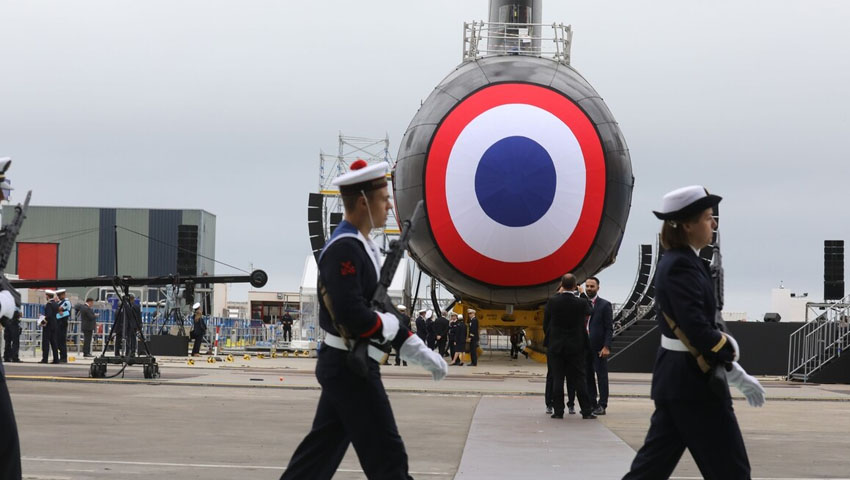It is interesting that one of the most advanced and, on its creation, staggeringly innovative energy sources know to humanity is forcing the most torpid and retrograde of debates.
To continue reading the rest of this article, please log in.
Create free account to get unlimited news articles and more!
There is a paradox contained in the recent calls to have the future Attack Class submarine returned to the original French design of nuclear power. It shows from those who seek increased endurance and protection for the capability currently residing with crewed submersible vessels a stunning lack of imagination.
Besides perhaps a level of hubris from military thinkers that see one significant but not all-encompassing capability compromising one of Australia’s key security tenets, that of nuclear non-proliferation.
Greg Sheridan has recently written that nuclear energy should not be ignored from economic considerations; this is a separate necessary debate. His central thesis is based on the still high global demand for nuclear fuel for peaceful purposes.
Developing an indigenous nuclear power capability for niche military purposes is a case of the tail wagging the dog.
Even if the reactor requires no refuelling over the 'life' of the vessel (of which most platforms Australia usually operates longer than other nations, hence raising an immediate problem), and constructed elsewhere, they can never be switched off until decommissioning.
This has significant infrastructure and resource costs beyond conventional systems. Not yet even considering the nightmare of safe disposal, will any other nation happily take our derelict reactors?
This must be part of the debate. There are significant costs (not downsides, costs) that cannot be assumed away for such an incredibly powerful yet dangerous power source.
Maybe it is worth the cost both financially and strategically. The costs are unquantified, in what is already the most expensive national security project ever undertaken and already what at the very least must be considered a medium risk venture (which is fine, that is what new capability advantage is all about, taking risks).
It is difficult to see how such a significant change would not demand a return to the federal cabinet and maybe a few “please explain”.
Given that not one word has been mentioned about this politically, perhaps the energy (pardon the pun) of experts in this field should be directed at solutions to achieve the same effect delivered by nuclear power in submarines.
A submarine, like all Defence combat capabilities, delivers kinetic force and very importantly, in the case of this platform, provides information in times of conflict and peace.
These tasks support reconnaissance and surveillance operations, all aspects of maritime control and in the future land strike and support to special operations.
Given the covert and independent nature of submarine operations, endurance and stealth are paramount. The necessary but perhaps at times overblown culture of secrecy that pervades all submarine arms, means they are poorly understood and underappreciated.
It is a unique and demanding command environment, unlike any other in its service or a defence force more broadly.
That does not mean it should not be subject to debate and query. The Department of Defence is most likely embarking on a large platform procurement that will deliver a vessel; just as a technology step is appearing.
Unattended systems, including underwater ones, are now in military operation.
The Royal Australian Air Force’s partnership with Boeing on the Wingman project commendably shows they are not waiting for someone else to take the step.
No one, publicly at least, has looked at what aspects of these technologies can provide the same effects as those provided by nuclear power. Not underestimating the difficulties of underwater navigation, but unlike flight, you can remain on station (stay submerged) expending relatively little power.
Unattended systems are but one example; how could neural networks assist in submarine sensor management and mission planning to increase endurance? What aspects of emerging quantum computing (which will be maturing at 2030), will help both communications and signals processing for sub-surface warfare? The list is longer than just this.
The German U-boat fleet in World War II developed submarine refuellers to extend the endurance of attack boats during operations off the US east coast. Thanks to Enigma and the obvious importance that these vessels were viewed they had little effect, being hunted as a priority by the allies. It does not invalidate the concept; the ability of your adversary to read your secret communications marginalises any initiative or innovation.
Is it time to revisit an unattended variant of this capability? Likewise, should later Attack Class variants be 'cargo' variants housing racks of underwater surveillance drones to spread a wider and higher endurance net to cue the crewed vessels.
Should one or two of the variants be turned into a dedicated and similar capability embodied in the USS Jimmy Carter to provide a regionally unique capability for our Special Forces?
These are the rantings of a maritime novice, minds immeasurably more powerful than mine energised by millions and millions of dollars have obviously looked at these options and considered them laughable.
That is why we are getting more of the same only better and, if you listen to the experts, you can make it better still. Trust us, you just pay the bill, fiscally and strategically.
Really, a car salesman pitch is the depth of maritime capability debate in Australia. The nuclear debate lacks any imagination; we saw what they had and want some.
It is perhaps time to show real innovation, which will also have considerable risk and additional cost, but at least we get options and potentially avoid being caught a step behind.
Jason Thomas is a Melbourne-based consultant specialising in strategic planning, organisational development and risk management. He previously served in the Australian Army in a range of command and staff appointments.

 Login
Login







